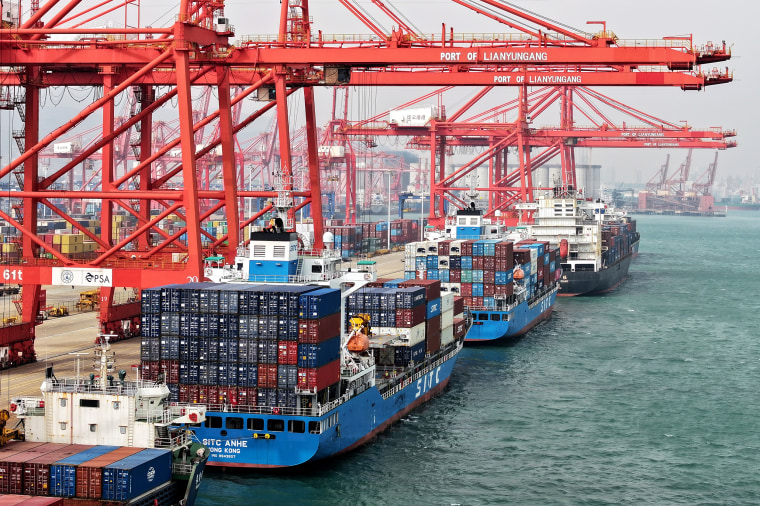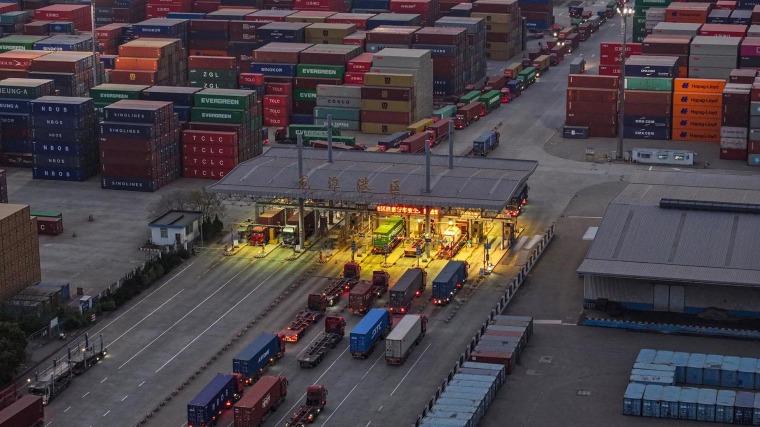HONG KONG — The increasingly vicious trade war between Washington and Beijing took another turn Wednesday when China imposed an additional 50% tariff on imports from the U.S., hiking its levies on American imports to 84%.
The tit-for-tat escalation came hours after President Donald Trump’s 104% tariffs on Chinese imports went into effect, including 50% Trump added Monday. Later Wednesday, Trump increased the overall U.S. tariff on Chinese goods to 125%, even as he paused higher targeted tariffs on other countries for 90 days while keeping a 10% baseline tariff in place for all countries.
Trump’s 50% tariff is a “mistake upon another mistake,” China’s Customs Tariff Commission said in a statement earlier Wednesday, adding that the world’s two biggest economies should “resolve differences through equal dialogue based on mutual respect.”
The effect of China’s 84% tariff may be somewhat limited because China imports only about $160 billion a year in U.S. goods compared with the more than $400 billion in goods it exports to the U.S.
“I don’t think they can match in the economic realm, because the relationship is so unbalanced,” said Rick Waters, the Singapore-based director of the Carnegie China think tank. “So what they tend to do is move into adjacent realms to exact a price.”
Here's a look at some of the other measures China might take.
U.S. agricultural products and poultry
China could greatly increase tariffs on U.S. agricultural products, or even stop importing them completely.
“I think there’s a very high chance that China will stop agricultural imports from the U.S. altogether,” said Tianchen Xu, a Beijing-based economist at the Economist Intelligence Unit, a financial forecasting service.
“It’s a weapon targeting Trump’s supporter base,” he added.
Soybeans, which are crushed to make protein-rich animal feed ingredients and vegetable oils, have been at the heart of the U.S.-China trade dispute for some time.
U.S. exports of soybeans to China fell 75% after China imposed a retaliatory 25% tariff on them in 2018, during Trump’s first-term trade war with Beijing.

The Trump administration announced $12 billion in subsidies for farmers to offset the impact, and it has again promised to step in if the latest round of tariffs hurts the industry further.
China could also put further restrictions on American poultry products, having announced an import ban on two U.S. companies last week.
Hollywood movies
China, which frequently trades places with North America as the world’s largest box office, is a crucial market for Hollywood films. Though China has an annual quota for the number of foreign movies that can appear in its theaters, it could ban Hollywood films altogether.
American movies have already been declining in popularity in recent years as U.S.-China trade tensions have escalated. There were no Hollywood films among China’s 10 highest-grossing movies in 2023, in stark contrast to 2012, when seven of the top 10 highest-grossing movies were U.S.-made, according to Maoyan, a Chinese movie-ticketing and data platform.
U.S. services sector and intellectual property
The U.S. has a large trade deficit with China in goods, but it comes out ahead when it comes to services such as finance, consulting and law.
U.S. data lists China as its fifth-largest export market for services, according to a report by China’s State Council released Wednesday.
China could target the U.S. services sector, for example, by excluding American companies from government procurement processes or restricting their cooperation with Chinese firms.

The U.S. has long accused China of stealing its intellectual property. But Beijing also has its own growing intellectual property interests, and it could investigate U.S. companies in China in an effort to protect them.
Fentanyl cooperation
China and the U.S. have made progress on stemming the international flow of precursor ingredients for fentanyl, some of which originate in China and are then processed into the deadly opioid in countries such as Mexico before being smuggled into the U.S.
But China could bring that cooperation to a halt in response to Trump’s tariffs.
“Out of humanitarian considerations, China has provided various forms of assistance to the U.S.,” Chinese Foreign Minister Wang Yi said last month. “The U.S. should not repay goodwill with hostility.”
Waters said it would be “counterproductive” for China to suspend cooperation on fentanyl.
“It’s just going to cement narratives in the U.S. that they’re weaponizing drugs against us,” he said.
